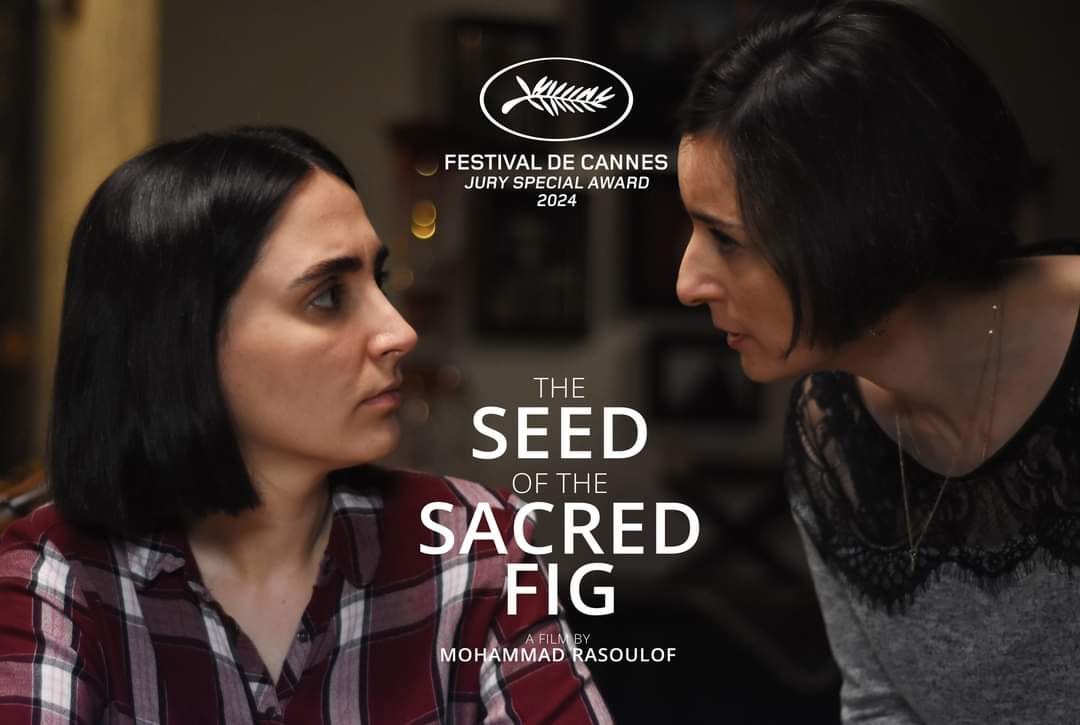
As is the norm I’ve chosen the quote above for my sub-title as a deliberate insight into the film and whilst it bears no relevance to the opening of this Oscar nominated film I’ve dissected below, it does shine a pertinent light on the central theme of the film. As you will discover for yourselves, the film hangs on a simple and seemingly innocuous through line of a missing handgun, but therein lies the awkward beauty of a quite astounding film and the themes of familial breakdown, deceit, responsibility, faith, paranoia, suspicion, the micro of the macro and the mirror all of these themes hold up to family life and the country they live in. On the surface is a traditional Iranian family and two parents in tacit support of the authoritarian Government under which they have known no other life. The same of course could be said for their two daughters, but whereas their somewhat cold and stoic mother decries protesters as “thugs”, her daughters have grown up in a more Western influenced social media age of differing, instant opinions and with each yearning for a more relaxed and free way of life, are excited by the demonstrations spreading throughout the capital city of Tehran. And then we have the patriarch of the family achieving a long held dream, a dream shattered almost on impact, and a missing handgun that quickly turns into a toxic mistrust of the family that surrounds him and following the overbearing and authoritarian society that spawned him he only sees one way in which to resolve the matter, and his dream becomes his wife and daughters living nightmare.
Nominated for Best International Feature Film at this year’s 97th Academy Awards, I hope The Seed of the Sacred Fig pips Emilia Pérez to the golden Oscar statuette if for no other rational reason that despite my loving the latter film, the film here was created under circumstances that are barely believable and yet (im)perfectly in line with the subject matter of the film. Director Mohammad Rasoulof was imprisoned and released and then sentenced to 8 further years in prison before fleeing on foot across the border and eventually to Germany where his film was sent piecemeal and secretly to him and editor Andrew Bird to shape into the incredible creation awarded five separate prizes at the Cannes Film Festival and subsequently, nominations at every film festival you care to name as well as the BAFTAs and the Oscars.
The opening minutes of the film are dissected below:
Following a host of multi international, German and European production partners a black screen follows with a continuing scrawl in white and in the native language of Farsi, translated as follows:
“Ficus Religiosa is a tree with an unusual life cycle. Its seeds, contained in bird droppings, fall on other trees. Aerial roots spring up and grow down to the floor. Then, the branches wrap around the host tree and strangle it. Finally, the sacred fig stands on its own”.
From this opening crawl we cut to an obscure and oddly framed close-up of a table as eight bullets are dropped one-by-one before an unseen individual to the left of the screen pushes a piece of paper and a pen across the table. From the right a similarly unseen individual reaches for the paper and pen but using another pen, quickly scrawls what can be assumed as a signature as the still unseen individual from the left collects both the unused pen and piece of paper. We cut to a man walking slowly toward the camera and down a long, dimly lit corridor pockmarked by several life-sized, cardboard images of Iranian generals and military figures before he stops in the only shard of light in the corridor and turning left, exiting the building. The man in question, now seen in repeated close-ups looking pensive and lost in thought driving his car through the daytime streets of Tehran is “Iman” (Missagh Zareh) and as director Mohammad Rasoulof quickly and cleverly cuts from his eyes to the passenger seat beside him we see a leather work satchel partly hiding a handgun. From daytime Tehran we now cut to Iman driving through a rocky and rural Iran at night and soon stopping and exiting the car he first places his hand on his heart before entering a mosque and praying in Farsi (no subtitles available) before driving away again in the dark of night as a small title in Farsi contained within a rectangle in the centre of the screen announces:
“THE SEED OF THE SACRED FIG”
Later that same evening we now find Iman’s wife “Najmeh” (Soheila Golestani) filling a tray with small snacks and a cup of tea and fresh from a shower, she insists her tired and weary husband eat something although he admits to being desperate to retire to bed. Talking quietly and sharing some snacks from the tray, Najmeh is full of smiles as she exclaims “Your prayer was finally answered” and “I wish your father could see this” as she excitedly talks of her husband’s promotion and their ability as a family to consider moving to a larger house and more importantly, their daughters can finally have a bedroom of their own. As Najmeh continues, Iman removes a handgun from a bedside drawer as he explains “I was given this for self defence” before asking Najmeh to hold it which reluctantly, she eventually does, before marvelling at how heavy it is before Iman returns the gun to the drawer as Najmeh continues excitedly that their children will be “so proud to find out that their Dad has become a Judge”. Iman corrects his wife and “Not a Judge, an Investigator” before she returns verbal fire with “but a Judge soon”, however Iman attempts to quell his wife’s enthusiasm a little by stating they, meaning the entire family, have to be cautious, careful, secretive even, as “You know how unpopular the revolutionary courts are”. Najmeh agrees but, setting the familial tone and her quiet power behind her husband’s outward authority, declares she’ll take care of everything and after talking to their children tomorrow, announce they as parents have some important news to share and only at that evening’s now planned family meal at a restaurant.
We cut to breakfast the following morning and the first introduction of the children with “Rezvan” (Mahsa Rostami) the older of the two and of university age and her younger, school aged sister “Sana” (Setareh Maleki) preparing the dining table for breakfast. As agreed with Iman, Najmeh confirms that a family “meeting” is planned for later in the evening as they both have great news to share with their daughters and wish to do so jointly as a family and although Rezvan has a long planned get-together with her friend to celebrate her birthday “family must be your priority”. Downcast, Rezvan eventually joins in with her younger sister in playfully teasing their mother as to what this fantastic news may be and although she won’t be drawn into specifics, Najmeh insists their father’s dream of 20 years is finally coming to fruition and as a result, “the girls” (repeatedly and often referred to collectively as “the girls”) will finally have a bedroom each to call their own. Sana cannot hide her childish glee at this prospect!
From breakfast we cut to the restaurant evening meal and a banquet inside a small, private area and Iman immediately confirming his promotion and new position and, importantly, whilst not a Judge, he’s now an investigator tasked with rigorously compiling and checking evidence against the accused in their country’s revolutionary courts. Rezvan asks somewhat innocently why her father is being so solemn and secretive in his statements if, as he explains, he’s simply tasked to gather evidence as an investigator of crimes against the state. Before Iman can respond, Najmeh explains the importance of her husband’s role and that he must remain anonymous for his safety and “that of the family”. There are often reprisals from family members or friends of the convicted Najmeh continues, giving rise to Rezvan wondering how “dangerous” this now seems for her father despite his promotion. Najmeh responds that both she and her younger sister are now old enough to be made aware of everything their father’s promotion entails not only for him and indeed for her, but them too, however “we’re going to move to a place with neighbours that are like us”. With Iman largely silent, Najmeh insists the girls must be as respectful of their father’s new position as they are of their faith, the wearing of a hijab at all times in public and “no photos of you on social media”. They must be “irreproachable” Najmeh continues, responsible, respectful and mindful of their attitude, clothes, their friends and the places they go. As the scene ends and despite the supposed happy occasion this family meal is celebrating, there are barely any smiles to be seen from anyone in the family around the table.
The final scene of the opening 12 or so minutes of the film returns us to the corridor first seen at the beginning of the film but now in more brighter daytime sunshine as Iman slowly walks toward the camera once more and down the corridor before finding and entering a side office from the corridor and after what appears to be a chain-gang of prisoners are led in a line behind him and away via an adjoining corridor. Frustrated, he laments to new colleague “Ghaderi” (Reza Akhlaghirad) that his current case has five large volumes of evidence to be verified and “it takes time to investigate” but Ghaderi advises him to remember the contract and conditions he signed for this promotion and as the prosecutor has already signed the indictment, not to bother investigating at all even though his signature will mean almost certain death for the defendant. “I’ve been working honourably for 20 years” he states, before continuing that he cannot simply sign off the case as it will break both his legal oath and his cherished faith. Ghaderi writes a simple word in Farsi on a nearby desk calendar, the word “WIRETAPPED”.
Thanks for reading. I hope this message in a bottle in The Matrix finds you well, prospering, and the right way up in an upside down world.
Whilst you’re here I may as well brag about the release of my trilogy of recently self-published books. Beautiful covers eh! As the title(s) would suggest, this is my life at the movies or at least from 1980 to 2024, and in volume 1 you’ll find 80 spoiler free appraisals of movies from debut filmmakers, 91 of the very best films appraised with love and absent of spoilers from 1990–2024 in volume 2, and in volume 3 you’ll find career “specials” on Paul Thomas Anderson and Quentin Tarantino together with the very best of the rest and another 87 spoiler free film reviews from 2001–2024.
All available in hardback and paperback and here are some handy links:
"A Life at the Movies Vol.1" - link to Amazon
"A Life at the Movies Vol.2" - link to Amazon
"A Life at the Movies Vol.3" - link to Amazon





